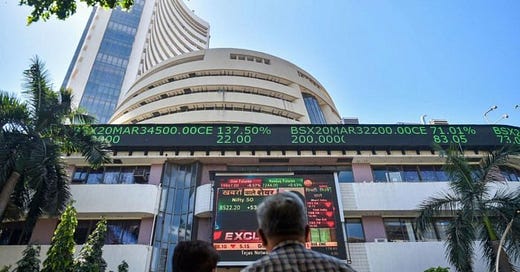📈 the valuation game
With markets at such high levels, Dalal Street is advising investors to book profits now!
Hey 👋
Hope you had a great weekend!
Welcome to the mesha tribe—a biweekly newsletter by Mesha, an exclusive social community that lets you chat with friends, discover stocks and participate in challenges all on one platform.
Sounds Good? Sign up below 👇
Awesome. Let’s gooo!
The Big Story
Much has been said in the news about Indian equities and their hyper valuations lately. For starters, the country's benchmark indices like the Sensex index is hovering way over 60,000 points, while the Nifty index is above 18,000 points.
And as more and more unicorns continue to emerge within the country, investors have been increasingly questioning their actual worth.
But fret not because the central bank has finally decided to clear the air on the issue.
In its latest November bulletin issue, several economists of the Reserve Bank of India commented on the state of the economy, saying that "the spectacular gains have raised concerns over overstretched valuations with a number of global financial service firms turning cautious on Indian equities."
So far this year, the Indian benchmark indices have outperformed major indices as traditional valuation yardsticks such as price-to-earnings ratio, price-to-book value ratio, and market capitalisation to GDP ratio stayed above their historical averages. The results were surprising given that the nation rebounded swiftly from the second coronavirus wave than initially anticipated.
While this may seem concerning, the central bank further noted that the percentage holding of promoters in companies listed on NSE rose by almost 50 basis points (one basis point is 0.01%) to 44.90% in September 2021.
Historically, there's been a positive correlation between promoter holdings and a firm's valuation as a steadily increasing stake builds confidence in the business and strengthens ongoing valuations, which is obviously a relief for investors.
Weeell,
Although these domestic indicators may show some improvements, China's debt crisis (remember Evergrande?), global supply chain disruption, and high commodity prices have created inflationary concerns and introduced further volatility in the markets.
This growing uncertainty is what led several advisory firms such as financial UBS, Nomura, Goldman Sachs, CLSA, and Morgan Stanley to downgrade Indian stocks and advise investors to book profits now.
"Rich valuations, a high probability of earnings disappointment, and a potential lack of marginal buyers add to our motivation to book profits on India," CLSA's analysts Alexander Redman said in a report titled 'Indian equities: On borrowed time.'
Having said that, the overall picture isn't all that bleak.
On the global front, the Indian economy is clearly differentiating itself while other nations struggle with supply disruptions, surges in COVID-19 infections, and stubborn inflation. Faster vaccination rates are increasing domestic mobility, which is recouping the job market. This, in turn, is bolstering the credit and monetary conditions favourable for a long term economic recovery to take place.
How long will this recovery process be for India? Well, it’s something we just have to wait and see…
Share what you learn 🤝
That's all for today. If you found this newsletter insightful, share it with your friends and colleagues and let us know what you think. Thank you for reading!
We, at Mesha, believe in democratizing finance. Join us and be a part of a community that helps you to take your net worth #ToTheMoon🚀
Until next time, Bye!








👌👍❤